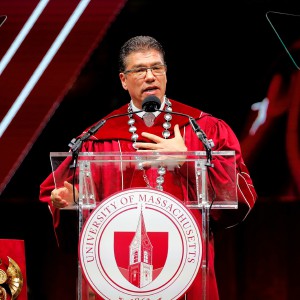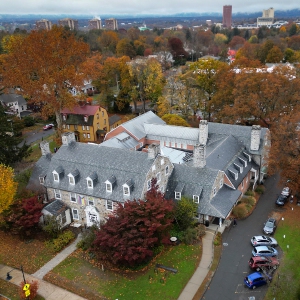A unifying voice: Amherst fifth graders testify in unison at state capital hearing in favor of bag ban
| Published: 06-21-2023 7:49 PM |
BOSTON — What started as a campaign against single-use plastic at Crocker Farm Elementary School became a lesson in political advocacy for fifth graders Nina Hirschberg and Bailey Millay, who testified on Beacon Hill in support of anti-plastic legislation last week.
Hirschberg and Millay accompanied Rep. Mindy Domb, D-Amherst, to convince lawmakers why they should support Domb’s bill (H 784) proposing the state ban retail stores from distributing single-use plastic bags. The pair delighted lawmakers during a hearing for the Joint Committee on the Environment and Natural Resources when they recited what Millay considered to be “the more important parts” of their testimony in unison.
“You may have revolutionized giving testimony,” Rep. Dan Cahill, D-Lynn, said to the girls once they finished reading their prepared remarks. “If everyone [spoke] at the same time, it would be much appreciated.”
The testimony was not the fifth graders’ first time working in harmony. Hirschberg and Millay’s interest in reducing plastic waste began last fall, when the pair convinced their school cafeteria to package breakfast meals in paper rather than disposable plastic bags. They established a petition for students to express their frustration with the plastic packaging, collecting signatures during recess and writing a persuasive essay about plastic alternatives in their free time.
“It became their passion,” Crocker Farm teacher Mary Donovan recalled. “They just were really motivated and determined to stop the amount of plastic that we had in the classroom.”
Hirschberg and Millay connected with Domb thanks to an introduction from Jean Fay, a paraprofessional at Crocker Farm and former president of the Amherst-Pelham Education Association. Fay helped the pair realize they could scale up their anti-plastic movement, according to Leslie Dougherty, who also teaches at Crocker Farm.
“If you connect with the people working in your state, you’re going to get more done than if you’re just writing an essay to your teachers in school,” Dougherty said.
Political advocacy was new for Hirschberg, but not beyond her realm of possibility.
Article continues after...
Yesterday's Most Read Articles
 ‘Home away from home’: North Amherst Library officially dedicated, as anonymous donor of $1.7M revealed
‘Home away from home’: North Amherst Library officially dedicated, as anonymous donor of $1.7M revealed
 Super defers Amherst middle school principal pick to successor; one finalist says decision is retaliation for lawsuit
Super defers Amherst middle school principal pick to successor; one finalist says decision is retaliation for lawsuit
 Granby Bow and Gun Club says stray bullets that hit homes in Belchertown did not come from its range
Granby Bow and Gun Club says stray bullets that hit homes in Belchertown did not come from its range
 Connecticut man gets 8 years in Hadley shooting
Connecticut man gets 8 years in Hadley shooting
 Design Review Board in Amherst backs 5-story apartment project connected to old Hastings building
Design Review Board in Amherst backs 5-story apartment project connected to old Hastings building
 Political newcomer defeats Shores Ness for Deerfield Selectboard seat
Political newcomer defeats Shores Ness for Deerfield Selectboard seat
“I did think a little bit about doing it when I was older,” Hirschberg said, but ultimately chose not to delay her interest in activism. “Whenever an opportunity pops up to change the world, then you have to take it.”
Millay attended a program during the previous summer where campers discussed climate change and learned strategies to spread environmentalism. Through education, Millay learned how to channel her fears of climate change into action.
“I feel scared and anxious a lot,” she said. “That’s mostly why I’m doing this — to try and stop it.”
Millay is not alone in experiencing climate anxiety, according to Donovan, who says exposure to news of climate change makes students interested in protecting the planet. After assigning students to write persuasive essays and report on famous change-makers, Donovan found more of her class opted to write about environmental issues than during previous school years.
“This is a group of kids who are very conscious of the world around them,” Dougherty said of Hirschberg and Millay’s grade, noting that Crocker Farm students learn to think critically about concepts such as climate change both in the classroom and at home.
Hirshberg and Milly spent a week researching climate change statistics ahead of their testimony, telling lawmakers that 150 species of plants and animals go extinct every day on average, and by 2050, the tonnage of plastic in the ocean will weigh more than the sea creatures who live there.
These facts surprised Hirshberg, whose goal was to shock listeners into action.
“We are trying to kind of blow people away with the scary facts,” Hirschberg said. “We were just trying to make people really understand that our world is in danger.”
Elected officials in Massachusetts have introduced legislation proposing a ban on plastic bags throughout the past decade, but the issue has never come to a vote, in spite of mounting interest from the 156 cities and towns that have introduced municipal plastic bag bans.
“If the bill passes, then we won’t have to do anything about it,” Millay said when asked how she and Hirschberg plan to respond. “Next year, we probably will do something about it again if the bill doesn’t pass.”
Until then, spirits remain high among the pair of environmental advocates. Their fellow fifth graders tuned into the livestream of Hirschberg and Millay’s testimony, and Hirschberg is confident that if they continue to spread their message, the future of the planet will be in good hands.
“I try to think about how I can change it, and I know that one person can’t make a very big impact,” Hirschberg said. “But if they collect other people … if there’s a bunch of people, then maybe we could save the world.”

 Sharing a few notes: High schoolers coaching younger string players one on one
Sharing a few notes: High schoolers coaching younger string players one on one Reyes takes helm of UMass flagship amid pro-Palestinian protests
Reyes takes helm of UMass flagship amid pro-Palestinian protests Sole over-budget bid could doom Jones Library expansion project
Sole over-budget bid could doom Jones Library expansion project Amherst poised to hire police department veteran as new chief
Amherst poised to hire police department veteran as new chief 